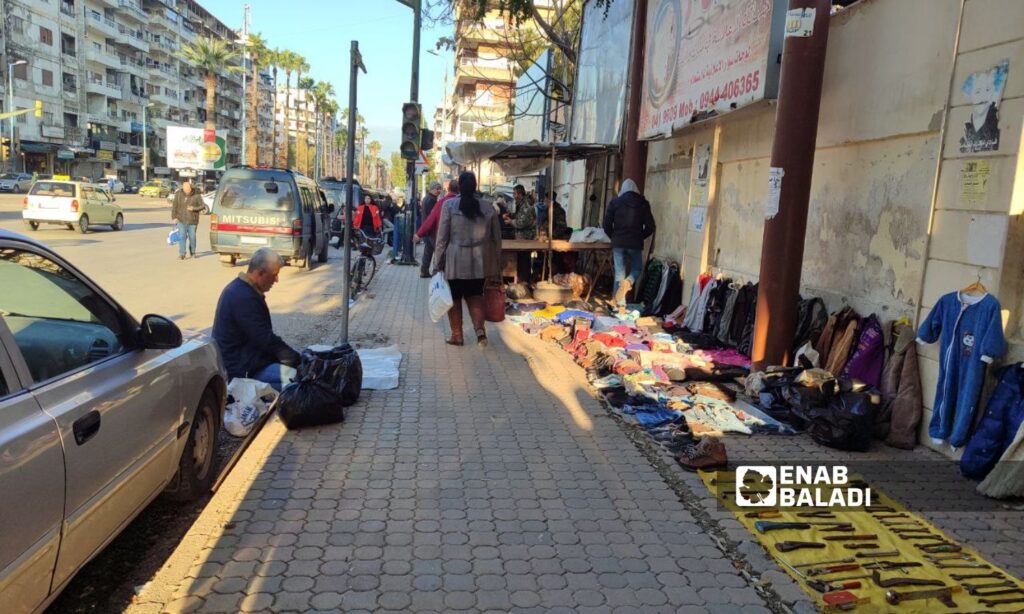Latakia – Linda Ali
Ahmad (pseudonym), 45 years old, incurs losses of hundreds of thousands of Syrian pounds each time the government announces a prolonged holiday, such as the current nine-day break for Eid al-Fitr.
Ahmad, who runs an office near the Finance Directorate in Latakia city, has to cease his work for a full week during each holiday. This means not only a disruption to his business but also harms the interests of his employees. His office provides printing and photocopying services to citizens with transactions in the financial departments.
The long break made it impossible for Ahmad to give generous Eid bonuses to his workers. Closing for a whole week per month leads to substantial losses amidst numerous costs, including taxes and the rent he pays for his office.
Ahmad’s example is reflective of all similar offices near directorates and institutions that provide services to citizens, like real estate affairs offices, as well as book shops close to Tishreen University, the municipality, and others.
On the flip side of the offices’ suffering due to the prolonged holidays, citizens who have urgent transactions to complete are also affected. Especially in the courts, all activities are postponed until after the holiday ends and appointments are rescheduled, potentially leading to long delays due to the backlog caused by the long break.
Lawyers, who rely on litigation fees for their livelihood, transaction follow-up agents, and even small kiosk owners selling beverages, who mainly depend on employees for their income, are negatively impacted.
The Council of Ministers of the Syrian regime’s government issued a statement setting the dates for the Eid al-Fitr holiday in 2024. It mentioned that public entities would be closed starting from Sunday, April 7, until the 13th of the same month, taking into account entities whose nature of work or circumstances require continuity.
School students affected too
Particularly disadvantaged by the lengthy holiday are school students, especially those in secondary and preparatory education. The poorer among them, who cannot afford private tutoring, find it challenging as exams approach and the need to finish the curriculum increases, while the long holidays prevent that.
The current academic year witnessed three long holidays: Christmas and New Year, the mid-term break, and Eid al-Fitr, amounting to almost a full month in total.
Insaf, 38, a mother of three primary school children, stated that even though her children are not in the stages of preparatory or secondary school certificates, she struggles with getting them back to school and into the study routine after each new long holiday is announced.
Insaf added that the educational situation in her children’s school in Latakia is already suboptimal, with overcrowded classrooms of students who have lost the sense of importance of school and responsibility towards studying due to neglect and lengthy holidays.
Long holidays lead to a curriculum pile-up for all students, and university students’ issues are no less severe. After the holiday, university course instructors must compensate for lost lectures rapidly, resulting in less thorough explanations and greater difficulties for students, who have no alternative means of understanding the material unless they can afford private lessons.
Layan, a 20-year-old third-year architecture student at Tishreen University, is very happy about the holiday, which means she can save on transportation costs since she lives in the countryside. However, she is also aware of the significant academic pressure the holiday will place on her and all her peers in scientific colleges.
With ongoing holidays, it becomes impossible to complete the curriculum, so she will have to study and try to understand it on her own due to lack of money for private tutoring.
In the same context, government hospitals during the holidays are limited to emergency cases only, and all other cases are typically postponed until after the break.
For the benefit of employees
Government sector employees welcome the long holiday the most since it means saving on transportation costs, which can consume up to a third of a monthly salary with a minimum of about 280,000 Syrian pounds.
Economic expert Ammar Youssef told the government-affiliated Al-Baath newspaper that the government tries to save on gasoline and fuel by implementing long holidays. He added that such breaks have caused significant damage to the Syrian economy by delaying production and halting people’s transactions.
He noted that the holidays have significant negative repercussions, especially in the judicial field, where lawsuits are postponed to later dates, potentially leading to the loss of rights and harm to citizens’ interests. Additionally, the holidays impact external dealings, as foreign trade and industrial exchange halt due to the absence of the necessary administrative mechanism to handle these breaks.

